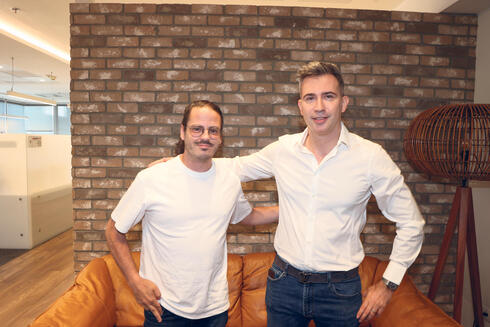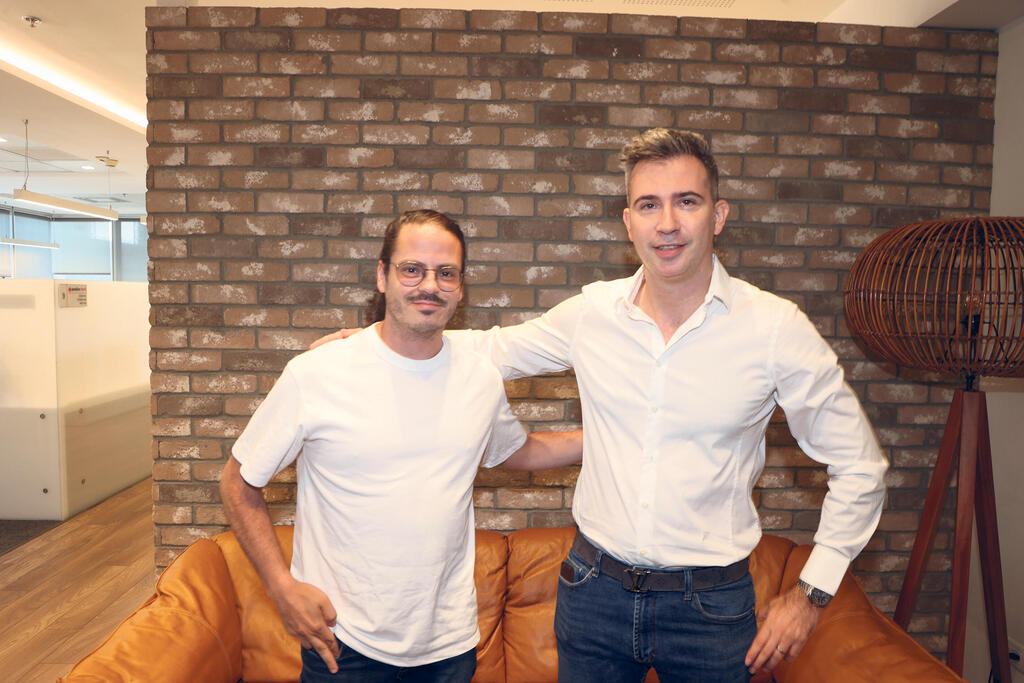
"One of the beautiful things about Israeli high-tech is that we are all committed to delivering"
As part of Calcalist and Poalim Tech’s Growth+ initiative which connects experienced entrepreneurs with early stage startups, Yevgeny Dibrov from Armis Security and Matan Nataf from Rapydo have been meeting and sat down with Calcalist to discuss growth in a challenging environment
Yevgeny Dibrov, Co-Founder and CEO of cyber company Armis Security, met with Matan Nataf, CEO of Rapydo which specializes in cloud database automation. The conversation took place as part of Calcalist and Poalim Tech’s Growth+ project to strengthen the resilience of the high-tech industry in Israel. This initiative includes a series of one-on-one meetings between experienced entrepreneurs and early-stage startups aimed at providing advice, support, and knowledge on entrepreneurship and creativity, managing startups, and building companies for growth.
Yevgeni, tell us about a crisis you encountered early on and what you learned that could help young entrepreneurs.
"There were many difficulties - there always are. The strength of a good entrepreneur is to emerge from a crisis having learned something. We went through a feedback process with customers. We sold to a few initial customers and everything went smoothly, then at some point we felt that we were struggling to jump from the first 5-6 first customers to the next 30-40. At one of our board meetings, the question arose as to what exactly the customer is buying versus what we're selling. After diving into it, we discovered that what the customer was buying was a little different from what we were selling, and then something changed in how we sell the value that the company brings. This process of understanding the real pain points of the customer put us on a different path from which we really took off. We also changed something in the product. What can be misleading is that the first customers sometimes come from personal acquaintances and trust in the vision and the people."
Matan, what was the biggest challenge you faced in the past year?
“First of all, what has been happening in the country since October 7, the war, our people who were in reserves, and the whole atmosphere greatly affected the day-to-day. It's hard to start a startup under any circumstances, and in an environment where the team is suddenly reduced by 20% and everyone has to do 1.5x as much work it was very difficult. But one of the beautiful things about Israeli high-tech is that we are all committed to delivering. It happened naturally. Without us saying anything, people just naturally went from full-time to 200% without anyone pressuring them."
Yevgeny, what advice did you give on this issue?
"There are difficulties at a startup all the time, and strength is knowing how to grow and adapt to all the challenges."
What did you learn from each other?
Matan: "One of the important things I took from the conversation is to look for the demand, and when there is a demand, we create the reality - it doesn't matter if it doesn't exist. We’ll work without resting and create this reality. It's a mindset that I didn't really have. I would say, 'It's not supported yet,' and Yevgeny told me if it's not supported, then make it supported. If necessary, I create the reality; that's one of the important things."
Yevgeni: "Ultimately, we have many things in common on this journey. We build a big platform, but in the end when we build another product, it's like another startup. When there's an opportunity, a real pain, something the customer is dealing with, there's a budget, so we go and build it. We're going to build super fast and work very closely with the customers because what matters is what the customer needs at the end of the day and how our vision adapts to what the customer needs."
Tell us something interesting or surprising you learned about each other.
Matan: "I was surprised that, even though today Armis Security is a company of 750 people with hundreds of customers, Yevgeny is still the person who gets on the plane and meets with the CTO and makes the sale. He has a real passion for meeting customers and solving business problems with technology."
Yevgani: "Matan said that, despite the difficulties along the way, all of the original people first hired three years ago are still with them. This is unusual. It says a lot about the DNA and the culture they built at the company."














